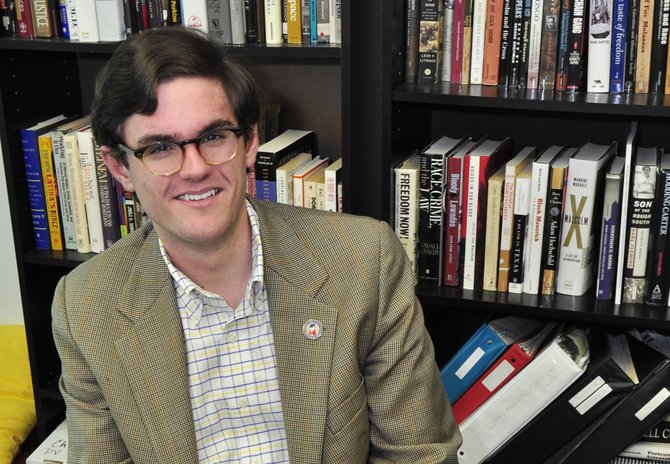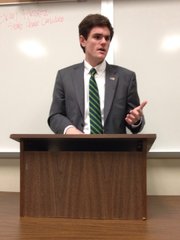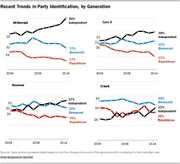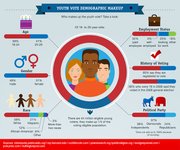Evan Alvarez made a media splash when he ditched his post as president of the Mississippi Federation of College Republicans to join his former nemesis, the Democratic Party. Photo by Trip Burns.
Evan Alvarez may be young, but he already fits the bill of a southern politico.
On a recent visit to the Jackson Free Press offices, Alvarez, 21, wore a tweed blazer, polished loafers, gentlemanly round glasses, his hair swooping to the side.
Alvarez's fastidiousness drew several compliments, but it was his resignation from his position as chairman of the Mississippi Federation of College Republicans and switch to the Democratic Party that has Mississippi and the nation buzzing.
A 21-year-old senior studying political science at Mississippi State University, Alvarez is a graduate of Ridgeland High School who early on decided to dedicate his life to helping spread the Republican message.
After some time at Delta State University, he decided to transfer to MSU. Eventually, he began his campaign for the chairman of MFCR and won.
The deeper Alvarez got into the Republican Party, the more he began noticing that it was a different world—especially when a fellow party member threw out racial slurs about him and his Cuban father.
He had enough.
After he resigned and changed his political affiliation, a media frenzy ensued. The Democrats welcomed him; the Tea Party criticized him. He sat down with us to talk about his life post-resignation, his new career goals, having cancer at a young age and how a second-grade play changed his life.
How does it feel to be a Democrat? Do you feel any different?
Oh yeah, I feel different. I feel relaxed. I feel like I can be myself. When I was a Republican—especially when I was the chairman of College Republicans—I had to be always on top: What's my public image? I have to tweet this out, I have to do this. And now, I can just be myself. I had been a Republican my whole life. My family is Republican but not the idiotic tea-party crazies. I always thought the Republicans were good, you know, they stand for morals. But then, I got into the position of leadership in the Republican Party, and I saw everything that happened behind the curtains. They say they are for all these morals, but yet, they'll stab you in the back the first second they can.
I haven't said this too much, yet. One of the main reasons that pushed me to the brink of changing parties—besides the tea party, besides the immigration aspect—was never in my life, 21 (years), had I had a racial slur uttered to me until I was in a leadership position in the GOP. My father was from Cuba, and he came over in 1959 to get out of the Communist regime that was going on. He was professional, went through college, got a bachelor's (degree) and master's at (Louisiana State University). But I was called an un-American spic. I was told if my father would have never gotten in the boat from Cuba, we would have never have to deal with you. These were people that I was saying, "OK, they may be a little crazy, but those are my allies." When I went home, I was like, "I've had enough—of all this. I did nothing to those people." They don't know my father, first of all. Second of all, my father passed away when I was 3 years old.
I had never been adamant against racism, and I would say, "That's how people are," but when it happened to me, it got me to look and see that this is an issue. I told people at the GOP and they said, "Oh, you should just get over it."
I was like, no.
It had been a long time coming since I wanted to make the change because classes at MSU with Whit Waide got me to open my damn mind, as he would say. I had begun to examine a lot of stuff. The platform of the GOP was not the way I thought stuff should be. Not saying I believe everything on the Democratic platform: I believe more on the Democratic platform than the GOP by a long shot. The racial slurs were the final straw. They despise progress in anyway. If you aren't like them, if you don't dress like them, if you don't come from a certain family or certain prestige, they don't want to have anything to do with you.
I used to say the Democrats were bad people, but they are the nicest people in the last month I have ever dealt with. Not in just Mississippi, but around the country. I'm a Democrat, and it feels good. I'm more open to the issues, and I'm not so uptight. I went to a Mississippi Democratic party at Hal & Mal's last week, and everybody is just so relaxed. I can be a 21-year-old college student.
What got you interested in politics?
When I moved here in '99—moved from Baton Rouge to Jackson—I was in second grade at Ann Smith Elementary in Ridgeland. The second grade does a "God Bless America," or some American program, and I was chosen to act as U.S. Sen. Trent Lott at the time. I didn't want to do it, but my mom said it would be a great opportunity. Now, she regrets me getting into it. But I said, "OK, I got to play this act." So, I did that, and about a month before, I wrote the senator as a second grader probably writing in Crayon and not spelling right, asking him to come. My mom was like, "He's busy," but sure enough, the day of the performance, I was in my classroom 30 minutes before we had to go, and I got paged over the intercom, and it said, "There's a special guest here to see Evan." Trent Lott, his chief of staff, his whole crew came. He stayed and gave my mom his business card. Ever since then, I had been all in with politics. My mom always thought something was wrong with me when I was 10 years old and wanted to come home and watch C-SPAN.
What spurred your interest to be a part of the Republican Party?
I looked around, and everyone was a Republican. I looked at family, and everybody was a Republican. Living in Mississippi, even at that young age, I could see that Democrats were not the cool thing to do. At a young age, I had always called myself a Republican more or less because my mom was, my dad was, everybody around me was, so I think it was more of less me saying: "I better do this. I better have these beliefs because the social norm around here."
Whenever you resigned and switched over, you said that most of your family was Republican—how did they react?
Some of them were like, "Oh no, what happened?" I had to explain to them the whole situation. My family deserves to know everything. Once I told them everything that happened and what I was learning in college, they said, "We respect your decision, and we will always have your back." My mom admits that the Republicans have gone too far to the right; they weren't standoffish. My mom still hits a few jokes every now and then. I didn't get shunned from the family.
What was your role as the chairman of the Mississippi Federation of College Republicans?
I was kind of the face of the organization. There were a lot of people under me, and I kind of told them what I would like to happen and what needed to happen. I wasn't in it for a long time, but most of the time, one person would panel the stuff, and I would just approve it. My role was pretty much—because of the Senate election—dealing with tea party versus establishment drama. I was an adamant (Thad) Cochran supporter. I saw him as someone who truly cared about Mississippi and served his constituents no matter what race or party ... I did not like McDaniel. His views were way too far to the right. I kind of used my position to influence what people thought who we were supporting.
It was a much bigger role and much more serious role than I thought I was getting into at first. I don't know if that was because of the election or not, but I thought it was going to be quarterly meetings, and I would come in and gavel, bang, this is what we are talking about. But it was very stressful because of the election, and I got a lot of experience. I found out that being in the political spotlight is not what I wanted.
How does that differ from what you do now?
I'm not told what to do by somebody in D.C. The College Republican National Committee really gave me a hard time. They were adamantly behind Chris McDaniel because he was young and yadda yadda yadda. What I do now is I don't have to be afraid of who is looking behind my back. I can say my opinions and voice them freely. That's the best thing about the change: I am not controlled by anybody else but myself. I take my mom's and friends' opinions into account, but at the end of the day, I don't have to make a decision just because somebody else had authority over told me to. As of right now, I'm a college student at MSU in political science and just a politico.
When you resigned, how did the media treat you?
Democratic media are very nice—and some overly nice. MSNBC had me on "The Last Word with Lawrence O'Donnell." The Daily Caller basically took why I left and made it look like junk and put the (College National Republican Committee) president's opinion above mine. That wasn't cool, but I developed a thick skin because of the job.
The tea party, they're going to rip me to shreds everyday, but I don't give a sh*t about that. When I get ripped up by the tea party, I know I'm doing something to destroy them. The tea party and the CRNC (College Republican National Committee) said, "Oh, this kid is nothing to worry about, don't waste your time." If I'm nothing to worry about, leave me the hell alone. That was the big thing, it kind of rocked their boat a little. I inspired a few others to do it.
Do you think you are something to worry about from a Republican's perspective?
Yeah, I have some ill feelings, but I'm not going to go and attack them. Life is too short to focus on that. As of right now, I'm a senior in college, and I want to enjoy my senior year.
My star career has changed from being a politician. Now, I want to take the time, and instead of using my political experience, my policy and research experience for politics, I want to be a lobbyist for either the American Cancer Society or St. Jude in Memphis because I did have cancer when I was 15 months old, and I was treated at St. Jude. I feel like I can could go and do some politics, do some public policy stuff and leave one of those organizations knowing that I did something to help somebody versus to screw somebody like most of the professional D.C. politicians do. I'd love to be CEO of St. Jude someday. That's my dream job.
On Twitter, you said some things about the Obama administration. It kind of seemed like you weren't the biggest fan. Have your views changed since switching over to the Democratic Party?
I told somebody, maybe The Huffington Post, that my views started to change (in) mid-to-late January. Because of the position I was in and because I was running for that position—and then I won—I could tweet what I wanted to tweet. They were saying, "You need to hound Obama on Twitter." I was doing it as a part of my job. Did I agree with it? No. The past couple of days have really shown that the president is out for the better interest of America.
You have the House of Republicans suing him for using too much executive power, and then yesterday, asked him to use his executive power to do something about immigration. It doesn't add up. You could tell that he's trying to do something good while they are just trying to stomp their feet and cross their arms.
My personal opinions, Evan Alvarez's opinions, have been more so moderate Democrat to left Democrat since probably March. Chairman Alvarez's opinions were to hound Obama and hound every Democrat. If they have a D by their name, get out.
If you were to run for president, what kind of platforms would you run on?
First and foremost, I would run on acceptance of immigrants. It seems like our country has a problem with that right now. I was watching MSNBC last night, and a commercial that Al Sharpton did that said something like, "At one point, the Irish weren't welcome. At one point, the Chinese weren't welcome. Civil Rights with African Americans in the '60s."
Every race has been told that they aren't welcome, but we have seen our country move past that point.
If somebody wants to come into America and contribute to our country, if they want to take advantage of the freedoms we offer, let them do it.
But we cannot have this idiotic racism and close-minded to other groups of people because they don't look like us or speak the same language as us. I wouldn't be here if my father didn't come from Cuba.
Something else would be health care. Obama has done a pretty decent job with the health-care system. There are some flaws, but they are working to fix them. Health care is a big thing especially with preexisting coverage conditions.
Having a cancer when I was so young—even though my cancer was not going to come back, it was gone, bye, all I have is a scar to prove that I had it—my mom went to apply for regular insurance, and nobody would give me insurance. Cancer, red flag. The CEO wrote a letter: "This kid is cancer free." They said they didn't want it. My mom had to work as an assistant teacher at Madison Avenue just for insurance through the state employee's insurance.
So, I would definitely do something to get health care for cancer patients and people with preexisting coverage.
Definitely equal pay for everybody. You're not going to make it on $7.25. My mom, like I said, worked as an assistant school teacher while she worked primarily for the insurance, she got paid a salary, but when did the math, she was getting paid $5 an hour. That's unacceptable. People say, "$7.25 is perfect." When you do the math, it's not.
Whit Waide (MSU instructor) was telling me about that. Pay people what they are worth. Nobody is better or less than somebody else. Encourage growth in the economy. If you raise the minimum wage three bucks, you're going to have more people come out and apply for the job. The more people that are working could get off government assistance.
I want to make life easier for people.
Recent Trends in Party Identification by Generation
Most people assume a correlation between age and political affiliation. "If you're not a liberal at 20, you have no heart. If you're not a conservative at 40, you have no brain," the old saying goes. Socially liberal and fiscally conservative is what you hear of the millennial generation now. What many people don't take into account is the growing number of independents among younger generations--who reject both major parties. In 2014, over half of millennials identified as independents, showing the trend of a generation distancing itself from partisanship. As expected, more of the other 50 percent are Democrats, with the lowest percentage of Republicans in the millennial generation.
Source: Pew Research Center
Millennials With Attitude
The Institute of Politics at Harvard University studied the political attitudes of approximately 2,100 people ages 18 to 29. Their results, released in Dec. 2013, contained some surprising results. Among them:
—President Barack Obama's job approval is at an all-time low and mirrors Obama's national disapproval rate. Among millennials, Obama enjoyed an approval ratings of 37 to 40 percent.
—Fewer than 25 percent believed our nation was headed in the right direction.
—Fourteen percent of young Americans in the IOP poll believed the country is headed in the right direction. Another 49 percent believe the country is headed in the wrong direction, and 34 percent are unsure.
—Of the young people who voted for Obama in 2012, 17 percent said at the time they were polled that they would not support him if they could recast their vote. However, only 4 percent of disillusioned Obama supporters said they would vote for Republican Mitt Romney if they could revote.
—Millennials do not care for the Affordable Care Act. Fifty-six percent of young voters surveyed disapprove of the 2010 federal law, while only 39 percent approve. Those are in line with other national surveys of older voters.
—Around 50 percent believe that the ACA will drive up the cost of health care; only 10 percent believe medical costs will go down as a result of the law.
Demographics of Voters Aged 18-29
There are 44 million eligible young voters in the United States, making up one-fifth of the voting-eligible population. Here are the demographics for young people aged 18-29.
Source: Collegestats.org






Comments
Use the comment form below to begin a discussion about this content.
comments powered by Disqus